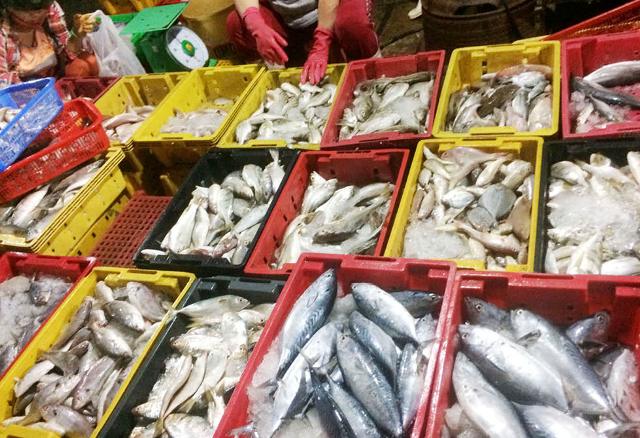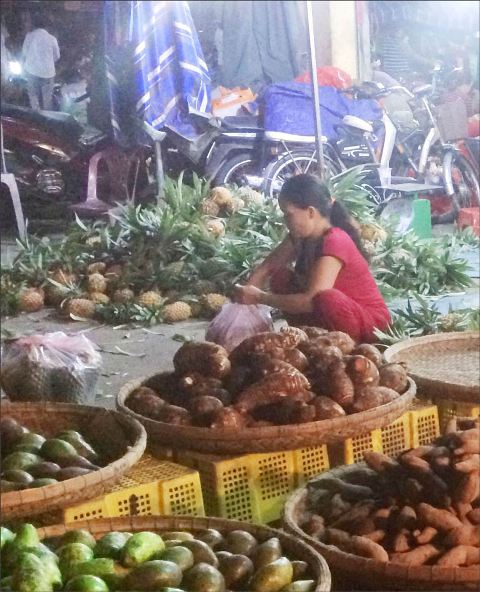
A corner of the market at 2 a.m.
Perhaps due to a scent, I found myself in this market. The smell of sweat seeped in a worn-out shirt of a bún (rice noodles) seller on To Hien Thanh street, where I dined in the afternoon reminded me of the smell of my mother's clothes after her day on the field. The seller’s name is Thu, who sells rice noodle by day, and going to the wholesale market to work as a porter at night to earn a little more money to raise her children.
The soul of the market
1 a.m., it’s the time when most of the Hue people have already had a sound sleep. The nightly diners near the market were still lit. Most of their guests were laborers, servers, and porters who were waiting for trucks to unload goods... More and more trucks arrived at the market. The gates were opened, and the whole space was filled with talking and laughing, the noisy truck horns ... as well as the croaking of the frogs. Mr. Ho Van Leo, a truck driver carrying vegetables from Dak Lak to the market cheerfully said: "What a relief! I thought I wouldn’t be able to get here on time for delivery, as the road was jammed due to a heavy rain.” The accent of the rough, dark-skinned man from the Central Highlands made me tilt my ear to hear him in the sound of the arriving trucks. Most of the agricultural products here are transported from Da Lat and some localities in the Central Highlands. Every night, hundreds of trucks come here to deliver vegetables for the merchants in the market. Phu Hau wholesale market is the source of vegetables and fruits for neighboring areas in the province and even for merchants from Quang Tri to resell in their market.

Seafood gathers at the market
The night became deeper, and the rumble of vehicles and working people was still going on. Away from those sounds, I smelt the smoke emanating from the market shrine. The unmoving lights and the scent of burning incense were as a rare retention of spiritual peace in the market.
Walking into the market, I had to acknowledge that even though I had stayed in Hue for a long time, it was my first time going to a night market. It was so wide, with a great variety of goods that I exclaimed in surprise; the market was too big compared to the one in my hometown. The sound from lively exchanges of goods, the dazzling faces lightening up in the night, the merchants from far away gathering to sell goods, etc. created a vigorous atmosphere on the hot night of Hue. The stalls were packed with colorful patches of tapioca, carrots, tomatoes, pumpkins, yams, vegetables, etc. as though they were the embodiment of the tropical agriculture right here in this market.

The vegetable kiosk
More and more merchants came to the market to buy goods at 4a.m.. The road began to get crowded with vehicles. The cock-a-doodle-doo was heard from neighboring households, signaling the arrival of the dawn. Ms. Van, a merchant in Huong Tra coming by motorcycle from 2 a.m. to Phu Hau, quickly put packages of vegetables onto the vehicle to go back early. She was happy to get a good shipment with a reasonable price. As she fastened the rope to secure the packages, she shared: "I have to hurry. My countryside market starts and ends really early, so I have to get back quickly to set up the stall." Then she started up the vehicle and got on her way in the early morning light, with her pants still fold up.
The bitterns at night
Sitting with Ms. Thu to wait for the container to come and unload the goods, I realized that most of this workforce was women. They were people with difficult circumstances, and wanted to make full use of their time and strength for money to cover their daily life. Therefore, whether the job was by day or by night, heavy or light, they still tried to finish it quickly and return home.
Ms. Thu, in her worker uniform and worn-out hat began to push the cart to carry the goods for the kiosks in the market. After finishing with the vegetable shops, she continued the delivery to the seafood section. Along with Ms. Thu was a young agile well-built woman named Lanh, from Phu Vang who came here early. While unloading carrots from the truck into the cart, Ms. Lanh shared, "There is no choice. I’ll do whatever work for anyone hiring me. No matter how hard it is, as long as I can get money to send my children to school.” When I asked if she was tired, she said she only felt exhausted after the work was done, and at the moment she didn’t feel it; she was already used to labor work.
During the break waiting for another truck to come and unload, I started talking to an older woman. She was from the North, the same place as mime. She was married to a man from Hue and considered Hue as her second hometown. She recalled, in the past her life was not so difficult, but since her husband suffered a stroke and had to stay home, she had to cover all expenses for medical treatment for her husband. Doing housework by day, selling beef porridge in the afternoon, she came here at night to unload goods for more income.
At the break of dawn, the kiosks were almost filled with goods for sale. The female porters took a temporary rest. They talked and laughed happily, fanning each other with their conical hats.
The sunrise came to sight in Phu Hau. The first sun rays shone down onto the flowers and grasses around, covering the wholesale market with a classic-colored embroidered chiffon blouse. The market started in the night and would soon end in the early morning sunshine, repeating its cycle in later sessions. On my bicycle back home, I kept thinking about the bitterns, who had to tirelessly sell their labour at night to survive...
Story and photos: Nguyen Huong